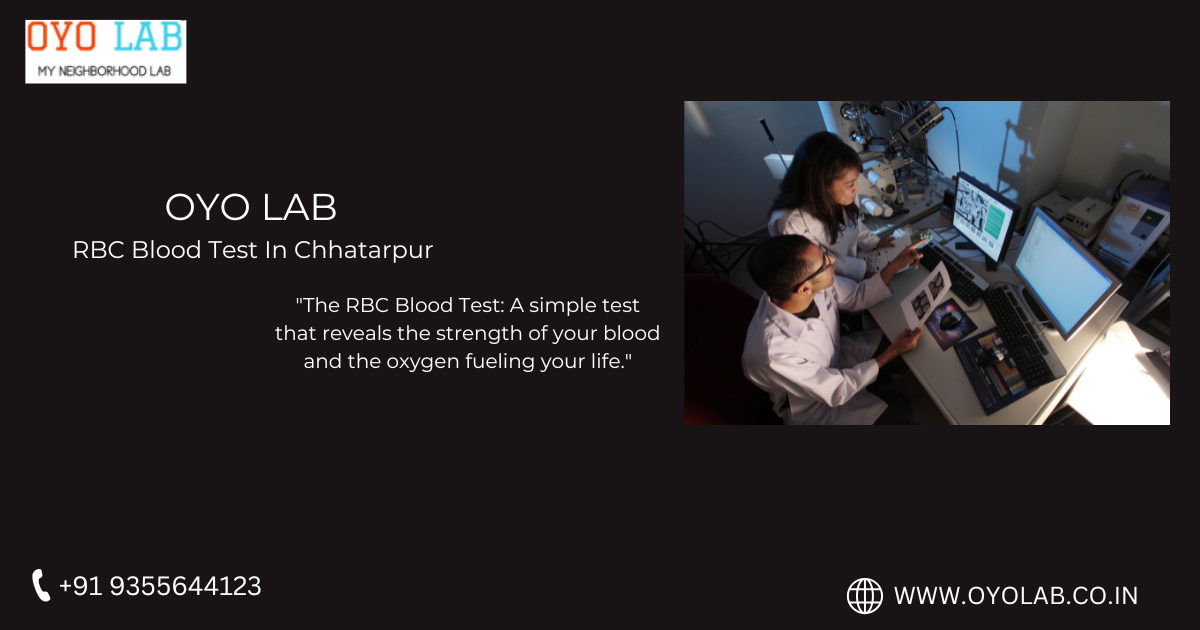
RBC Blood Test In Chhatarpur
By Shilpa | March 07, 2025
What Is RBC Blood Test ?
The Red Blood Cell (RBC) Test is a blood test that measures the number of red blood cells (erythrocytes) in your blood. RBCs are responsible for carrying oxygen throughout the body, making this test essential for assessing overall health.
Why Is It Done?
Doctors order an RBC test to:
- Detect anemia (low RBC count) or polycythemia (high RBC count).
- Monitor chronic diseases like kidney disease, heart disease, or lung disorders.
- Evaluate symptoms such as fatigue, weakness, dizziness, or shortness of breath.
- Assess overall health as part of a routine checkup.
Normal RBC Count (Varies by Lab & Age)
- Men: 4.7 to 6.1 million cells per microliter of blood
- Women: 4.2 to 5.4 million cells per microliter
- Children: 4.1 to 5.5 million cells per microliter
Importance Of RBC Blood Test
The Red Blood Cell (RBC) Test is a crucial diagnostic tool that helps assess overall health by measuring the number of red blood cells (erythrocytes) in the blood. Since RBCs are responsible for carrying oxygen throughout the body, this test is essential for detecting various health conditions.
1. Detects Anemia (Low RBC Count)
- Helps diagnose anemia, a condition that causes fatigue, weakness, dizziness, and shortness of breath.
- Identifies causes such as iron deficiency, vitamin B12 deficiency, blood loss, or chronic diseases.
2. Identifies Polycythemia (High RBC Count)
- A high RBC count may indicate conditions like dehydration, lung disease, heart disease, or bone marrow disorders.
3. Monitors Chronic Diseases
- Helps track conditions like kidney disease, heart disease, and lung disorders that can affect RBC production.
4. Evaluates Oxygen-Carrying Capacity
- RBC levels determine how well oxygen is transported throughout the body, which is critical for energy levels and organ function.
5. Assists in Diagnosing Blood Disorders
- Helps detect sickle cell disease, thalassemia, and other blood-related disorders.
6. Routine Health Checkup & Early Disease Detection
- Part of a complete blood count (CBC) test, which is commonly used in general health screenings.
Benefits Of RBC Blood Test
The Red Blood Cell (RBC) Test is an essential diagnostic tool that provides valuable information about overall health and helps detect various medical conditions. Here are its key benefits:
1. Early Detection of Anemia
- Helps diagnose anemia (low RBC count), which can cause fatigue, weakness, dizziness, and shortness of breath.
- Identifies potential causes like iron deficiency, vitamin B12 deficiency, or chronic disease.
2. Identifies Polycythemia (High RBC Count)
- Detects excess RBCs, which may indicate dehydration, lung disease, heart disease, or bone marrow disorders.
3. Monitors Chronic Diseases
- Helps track conditions like kidney disease, heart disease, and lung disorders, which can impact RBC production.
- Used to monitor treatment effectiveness for conditions affecting red blood cells.
4. Evaluates Oxygen-Carrying Capacity
- RBC levels indicate how well oxygen is transported throughout the body, essential for energy, brain function, and overall organ health.
5. Assists in Diagnosing Blood Disorders
- Helps detect sickle cell disease, thalassemia, and other blood-related disorders.
6. Part of Routine Health Checkups
- Included in the Complete Blood Count (CBC) test, making it a routine yet crucial test for maintaining good health.
- Helps doctors identify hidden health issues before symptoms appear.